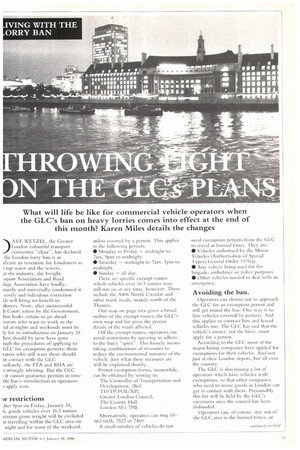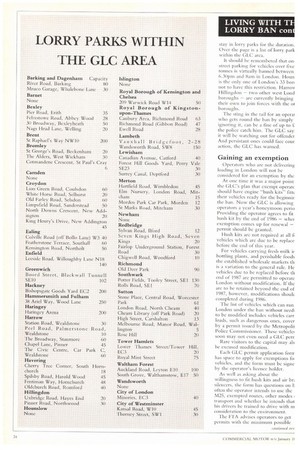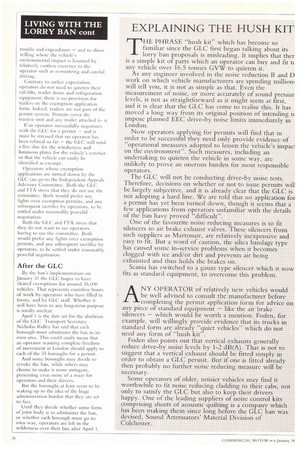What will life be like for commercial vehicle operators when
Page 23

Page 24

Page 26

If you've noticed an error in this article please click here to report it so we can fix it.
the GLC's ban on heavy lorries comes into effect at the end of this month? Karen Miles details the changes
)AVE WETZEL, the Greater London colourful transport committee "chair", has declared the London lorry ban is as
ificant an invention for Londoners as i tap water and the sewers.
:ir the industry, the Freight liSport Association and Road ;Lige Association have loudly, Aantly and universally condemned it costly and ridiculous restriction ch will bring no benefit to donors. Now, after unsuccessful Ii Court action by the Government, ban looks certain to go ahead. rators who want to work in the tal at nights and weekends must be ly for its introduction on January 31. lost should by now have gone iugh the procedures of applying to GLC for exemption permits; those rators who still want them should in contact with the GLC
aediately, the FTA and RHA are .1. strongly advising. But the GLC ; it cannot guarantee permits in time the ban's introduction to operators ) apply now.
ie restrictions her 9pm on Friday, January 31, 6, goods vehicles over 16.5 tonnes Kimum gross weight will be excluded n travelling within the GLC area on night and for most of the weekend,
unless covered by a permit. This applies to the following periods: • Monday to Friday — midnight to 7am, 9pm to midnight.
• Saturday — midnight to 7am, lpm to midnight.
• Sunday — all day.
There are specific exempt routes which vehicles over 16.5 tonnes may still run on at any time, however. These include the A406 North Circular and other trunk roads, mainly north of the Thames.
Our map on page xxx gives a broad outline of the exempt routes: the GLC's own map and list gives the precise details of the roads affected.
Off the exempt routes, operators can avoid restrictions by agreeing to adhere to the ban's "spirit". This loosely means taking combinations of measures to reduce the environmental nuisance of the vehicle. Just what these measures are will be explained shortly.
Permit exemption forms, meanwhile, can be obtained by writing to: The Controller of Transportation and Development, (Ref: TD/TP/POL/XP), Greater London Council, The County Hall, London SF.1 7PB.
Alternatively, operators can ring 01663 6435, 7522 or 7469.
A small number of vehicles do not need exemption permits from the GLC to travel at banned times. They are: • Vehicles authorised by the Motor Vehicles (Authorisation of Special ypcs) General Order 1979(a).
• Any vehicle being used for tire brigade, ambulance or police purposes.
• Other vehicles needed to deal with an emergency.
Avoiding the ban.
Operators can choose not to approach the GLC fbr an exemption permit and still get round the ban. One way is to hire vehicles covered by permits. And this applies to contract hire and leased vehicles too. The GLC has said that the vehicle's owner, not the hirer, must apply for a permit.
According to the GLC most of the major hiring companies have applied for exemptions for their vehicles. And not just at their London depots, hut all over the country.
The GLC is also issuing a list of operators which have vehicles with exemptions, so that other companies who need to move goods in London can get in contact with them. Presumably this list will be held by the GLC's successors once the council has been disbanded.
Operators can, of course, stay out of the GLC area in the banned times, or stay in lorry parks for the duration. Over the page is a list of lorry park within the GLC area.
It should he remembered that on. street parking for vehicles over five tonnes is virtually banned between 6.30pm and 8am in London. Houn is the only one of London's 33 bon not to have this restriction. Harrow Hillingdon — two other west Lond boroughs — are currently bringing their own to join forces with the ot boroughs.
The sting in the tail for an operal who gets round the ban by simply ignoring it, can be a fine of up to C the police catch him. The GLC say! it will be watching out for offender And persistant ones could face cour action, the GLC has warned.
Gaining an exemption
Operators who are not delivering loading in London will not be considered for an exemption by the At one time it was a major point the GLC's plan that exempt operate should have engine "hush kits" nut their vehicles ready for the beginnir the ban. Now the GLC is allowing operators a year's honeymoon perio Providing the operator agrees to fit hush kit by the end of 1986 — whet exemption comes up for renewal — permit should be granted.
Hush kits are not required at all 11 vehicles which are due to be replace before the end of this year.
For vehicles carrying fresh milk it bottling plants, and perishable foods the established wholesale markets di is a variation to the general rule. He vehicles due to be replaced before th end of 1987 arc permitted to operate London without modification. lithe are to be retained beyond the end of 1987, however, modifications shoulc completed during 1986.
The list of vehicles which can run London under the ban without needi to be modified includes vehicles carr loads, such as dangerous ones, cover by a permit issued by the Metropolh Police Commissioner. These vehicle soon may not even need a GLC perr Rare visitors to the capital may als be excused modification.
Each GLC permit application form has space to apply for exemptions fo vehicles, and the form must be signe by the operator's licence holder.
As well as asking about the willingness to tit hush kits and air bi-; silencers, the form has questions on h often the operator intends to use the M25, exempted routes, other modes 1 transport and whether he intends that his drivers be trained to drive with m consideration to the environment.
The ETA advises operators to get permits with the minimum possible trouble and expenditure — and to show willing where the vehicle's environmental impact is lessened by relatively costless exercises to the operator such as re-routeing and careful driving.
Contrary to earlier expectation, operators do not need to quieten their tail-lifts, trailer doors and refrigeration equipment; there is no provision for trailers on the exemption application tbrin. Indeed, trailers are not part of the permit system. Permits cover the tractive unit and any trailer attached to it.
If an operator successfully negotiates with the GLC for a permit — and it must be stressed that no operator has been refused so far — the GLC will send a free disc for the windscreen and luminous plates for the vehicle's exterior so that the vehicle can easily be identified as exempt.
Operators whose exemption applications are turned down by the GLC can go to the Independent Appeals Advisory Committee. Both the GLC and FTA stress that they do not use the committee. Both would prefer any fights over exemption permits, and any subsequent sacrifice by operators, to be settled under reasonably peaceful negotiation.
Both the GLC and PTA stress that they do not want to sec operators having to use the committee. Both would prefer any fights over exemption permits, and any subsequent sacrifice by operators, to be settled under reasonably peaceful negotiation.
After the GLC
By the ban's implementation on January 31 the GLC hopes to have cleared exemptions for around 35,000 vehicles. That represents countless hours of work by operators who have filled in forms, and by GLC staff. Whether it will have been to any long-term purpose is totally unclear.
April 1 is the date set for the abolition of the GLC. Transport Secretary Nicholas Ridley has said that each borough must administer the ban in its own area. This could easily mean that an operator wanting complete freedom of movement in London should apply to each of the 33 boroughs for a permit.
And some boroughs may decide to revoke the ban, while others may choose to make it more stringent, presenting even more of a maze for operators and their drivers.
But the boroughs at least seem to be waking up to the idea of the huge administration burden that they are set to face.
Until they decide whether some form of joint body is to administer the ban, or whether each borough must go its own way, operators are left in the wilderness over their fate after April 1.






















































